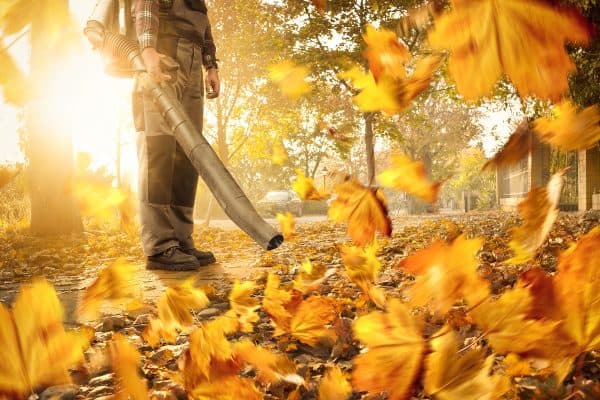Garden soils vary in type and composition. The composition directly affects plant health and development. Clay poses a challenge for many gardeners due to its density and compact nature. However, it provides a good foundation for plants because it is fertile and packed with minerals.
If you're struggling with clay soil, can you use a mulch to break it down? We've researched this to get an answer.
Mulch will improve your soil but it has to be mixed with the top layer of the clay. The ground composition will loosen as microorganisms break down the material and nutrients result as a decaying byproduct.
Apply mulch twice a year to further enhance the soil's quality for plant growth and development.
A layer of mulch improves aeration, drainage, and nutrient exchange. The following article aims to guide you on how to optimize plant productivity in clay soil combined with the benefits of mulching.
Clay Soil: An Overview
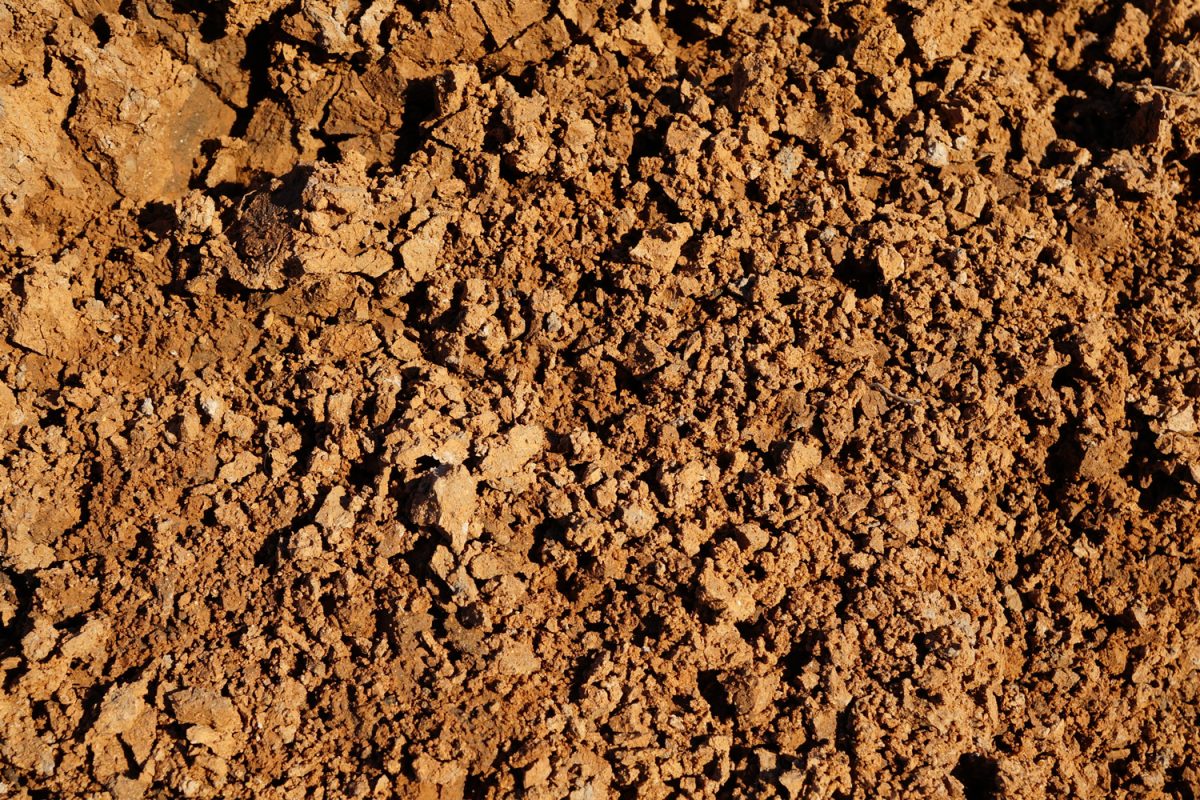
Garden soil is a mixture of mineral and organic particles, dirt material, microorganisms, water, and nutrients. Its ability to grow plants relies on texture, porosity, chemical content, and sustainability.
Clay particles are comparatively minute and compact, rendering the soil difficult to cultivate and sow. Seedlings and young plants do not generally thrive since the roots tend to be restricted.
If roots do develop, clay proves to be a good foundation because it encourages growth for plants that can tolerate less-than-ideal environments.
Due to its density, clay retains water, nutrients, and minerals longer than other soil compositions, this means less maintenance for your gardens in terms of watering and fertilization.
Minerals found in clay include sodium, potassium, calcium, and ammonium which are important to soil fertility. Some trees and shrubs grow well in clay but crops develop poorly since their roots cannot penetrate dense clay.
Its prevalence proves challenging when you attempt to grow a flower or vegetable garden, but clay soil can be improved and enhanced for cultivation.
Mulching
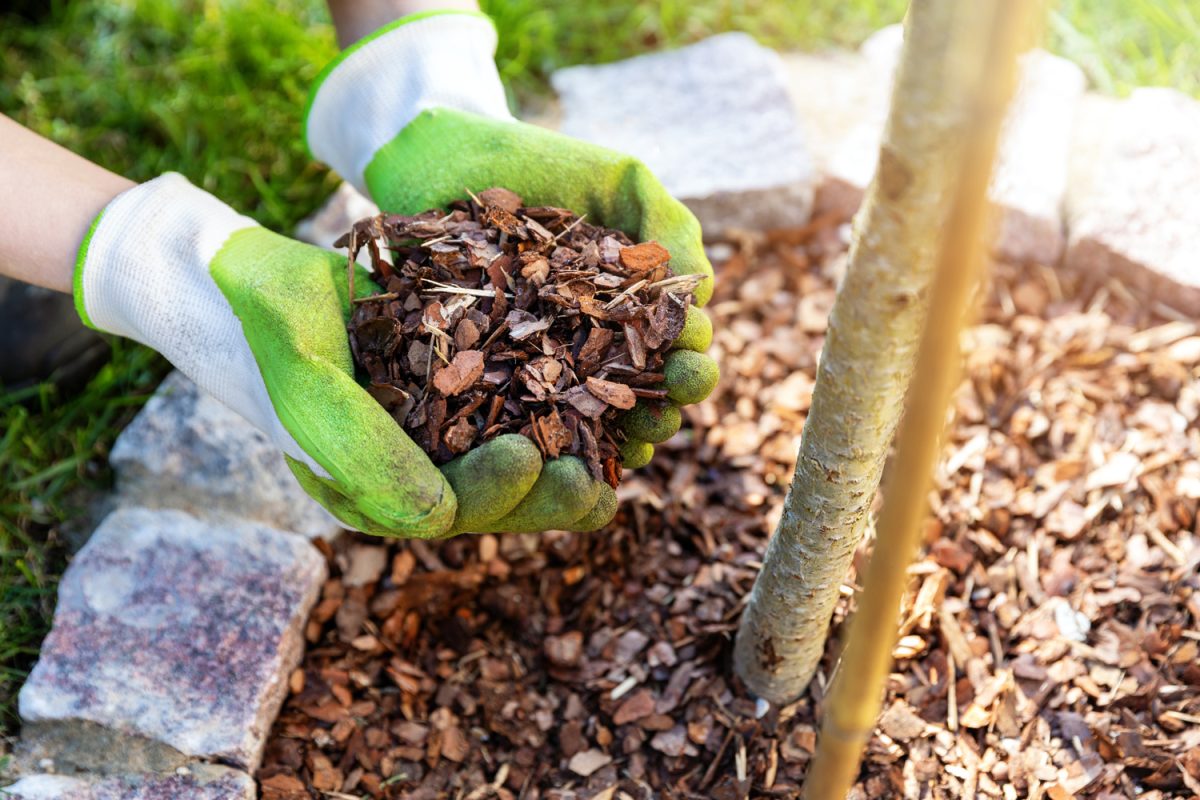
Mulch is a layer of material applied on top of the soil surrounding a plant. It functions to retain moisture, regulate temperature, prevent weed growth and provide nutrients.
Leaves, cut grass, hay, wood chips, and tree bark are among the common mixtures added to increase the organic content of the soil. Other materials include pebbles, sand, and newer synthetic mulch like rubber and plastic, which do not contribute to ground nutrients but provide permanent insulation.
Not all gardeners or agriculturists practice mulching. Typically, they rely mainly on fertilizer application and ground additives. The mulching process is actually a natural way by which plants and organisms interact and benefit in the form of an ecosystem.
Why Apply Mulch On Clay Soil?
Applying and mixing a layer of organic materials with clay soil significantly improves aeration and drainage. Aeration is the exchange of natural gases between the soil and the atmosphere.
Plant roots and microbes absorb oxygen and produce carbon dioxide so that O2 deficiency and CO2 toxicity are prevented in both the soil and the air.
A well-aerated soil helps the respiration of plant roots. Respiration is a natural process that plants undergo in order for them to grow and mature.
How To Apply Mulch To Clay Soil
When applying organic mulch on clay soil, you will have to dig the area and mix the uppermost layer of clay with your chosen natural material. Loosening the clay will allow the mulch to penetrate and lessen the soil density.
It may take some time for the organic material to totally integrate with clay but you can cultivate plants right away after the initial introduction of mulch. Since clay holds moisture and mulch retains it, refrain from overwatering the mixture.
Do not expect overnight results because it will take some time before microbes and earthworms break down natural mulch. You will have to re-apply another layer after a few months or a year.
How Do You Make Clay Soil Softer?
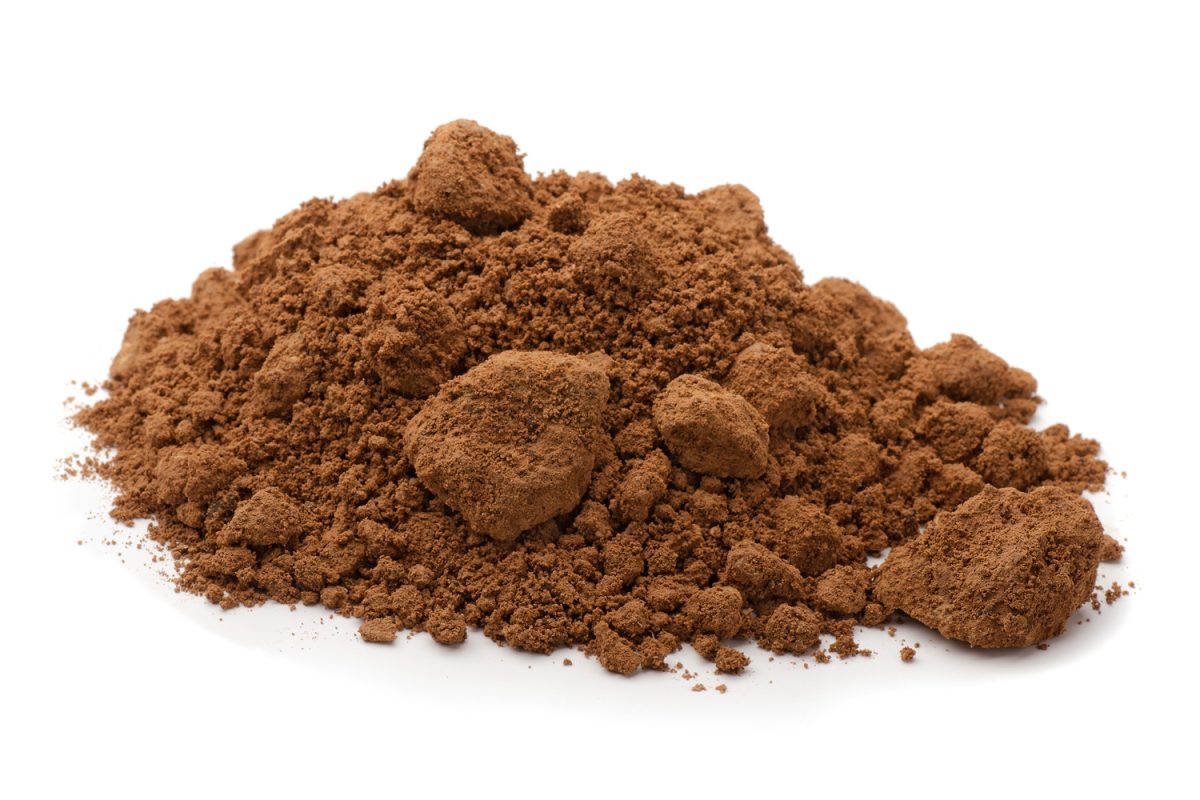
Clay soil is compact and hard as concrete when dry, and sticky and clammy when wet. It does not drain properly and the air content is too low. Plants would not get any nutrients since the soil cannot absorb carbon dioxide and nitrogen from the air.
If you intend to grow any vegetation or plants, you need to make clay softer so that the roots will develop freely and not suffocate. There are two ways you can do it, either by adding gypsum or by applying organic materials to the soil. The latter proved to be more effective and health efficient.
Gypsum
Gypsum is a mineral composed of calcium sulfate dihydrate. It is known to improve soil fertility, but this claim still lacks a concrete basis. It can serve as an effective way to amend soil requirements depending on circumstances.
Gypsum can harm plants if applied on acidic soils or those that have a pH level of 5.0 or lower.
It can be added to clay, however, there are certain considerations. This material is effective in treating sodic soils with high sodium content. Apply gypsum on your clay soil only if it has high levels of sodium.
Sodic soils have reduced permeability which means it is so dense that they cannot absorb normal amounts of water. When gypsum is applied, sodium content is slowly being replaced with calcium.
Calcium is important for plant growth and development simply because this nutrient keeps cell tissues healthy and promotes vigorous root formation.
Check out Organic Gypsum on Amazon.


Organic Mulches
Organic mulches are natural materials that decompose at a certain time, releasing nutrients into the soil that plants need. They are an inexpensive alternative to inorganic mulches. While this is true, they naturally dissolve into the soil which will then require you to change mulch every season.
Various types have different impacts depending on their purpose and usefulness. Some varieties have an adverse effect on plant development because they hold high carbon as opposed to nitrogen. Microbes present in the soil need nitrogen to break down nutrients.
Wood Chips
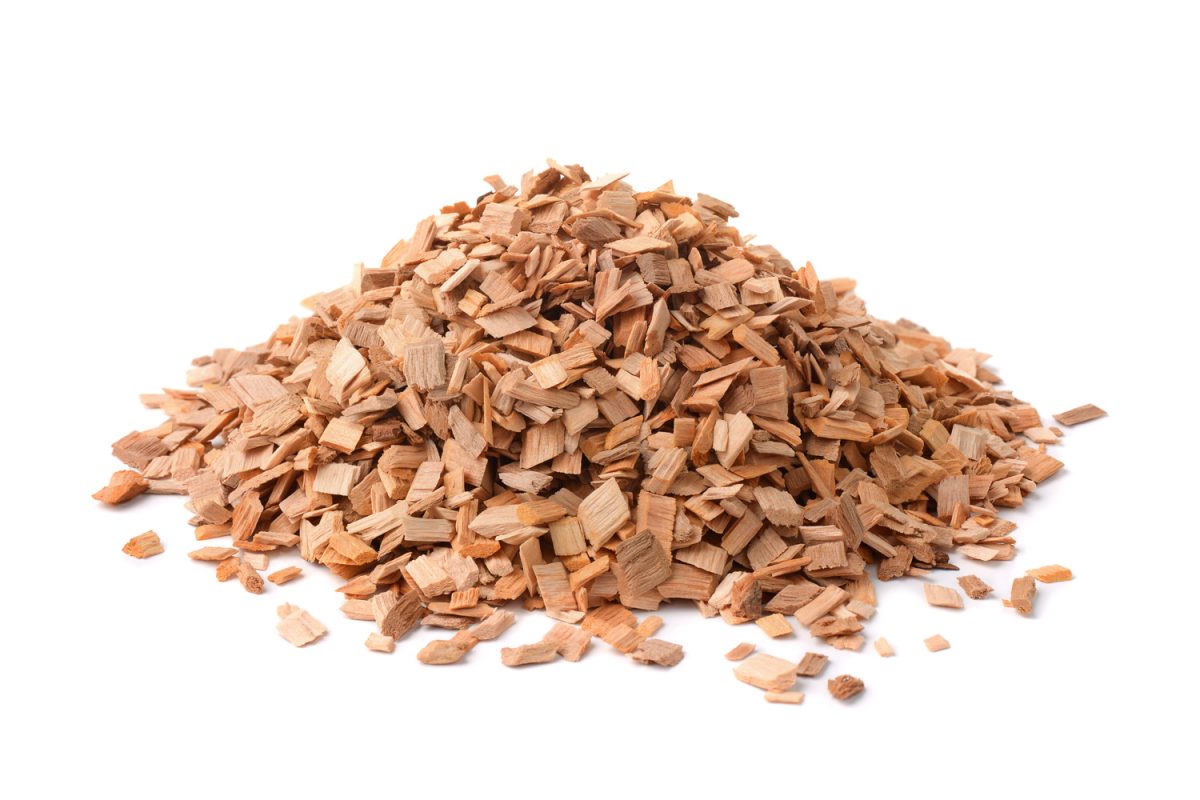
Wood mulch is a popular organic material because it is affordable. It is actually a byproduct of the lumber industry that goes through a certain process before being placed in large packs or bags.
Wood chips decompose easily, especially when moisture is added. Once microorganisms break down the material, they slowly enrich clay soil.
It is effective in impeding weed growth, retaining soil moisture, regulating soil temperature, and enhancing a property's visual appeal. It comes in two varieties - hardwood and softwood chippings.
Hardwood chippings decompose quicker, and as such, are best applied on flower beds. On one hand, softwood mulches break down slower which is why it is best used on trees and large shrubs.
Preferred variations are shredded, chipped, and chunks or nuggets of pine, cedar, and cypress.
Check out Natural Cedar Shavings Mulch on Amazon.
Newspaper Shreddings
Newspaper shreddings keep your plants and any other vegetation warm and safe from frigid conditions, making them ideal to use during the cold seasons. Like wood chips, this kind of organic mulch does a better way of reducing weed growth.
Apply a layer 5 to 10 sheets thick and cover the area with another natural material.
Straw
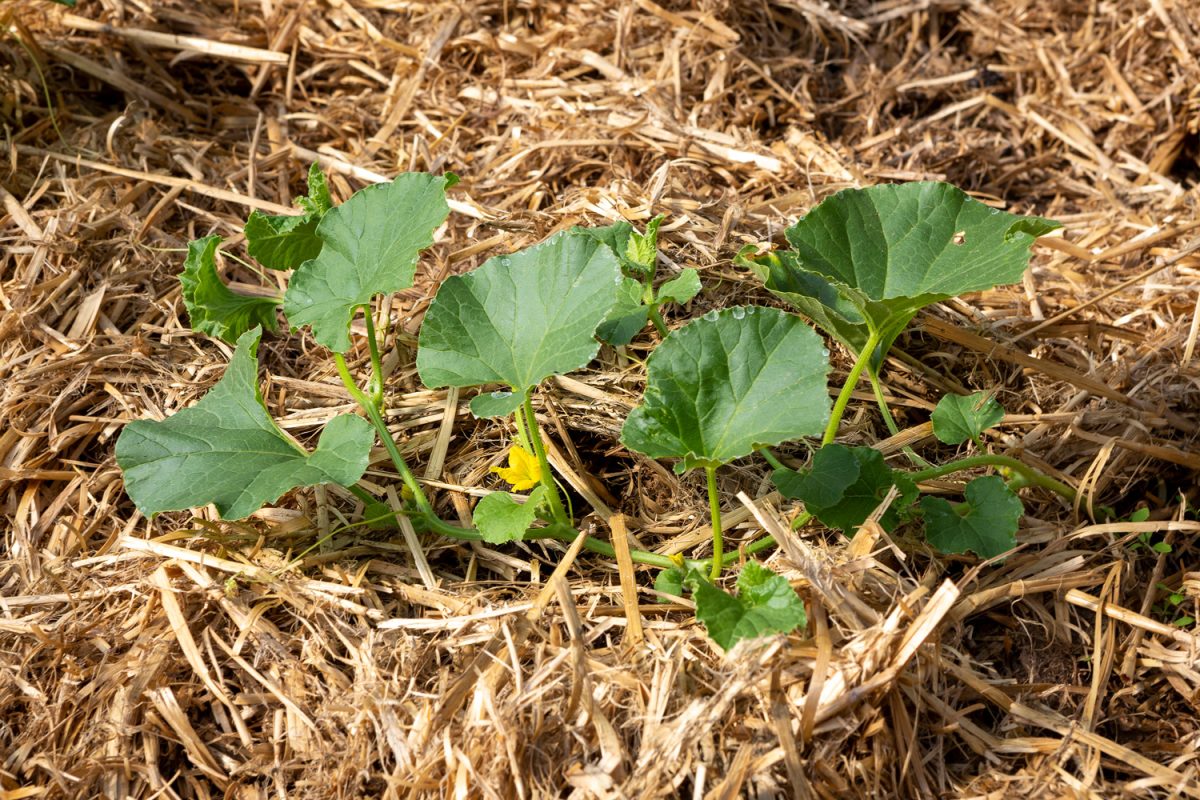
Straw mulch is ideal to use on vegetable gardens and newly-seeded lawns because it holds moisture well and has nitrogen properties that plants need to reach optimum growth. It also attracts beneficial insects because they use this material in their homes. They considerably keep pests under control.
A layer of straw mulch functions as a barrier between the foliage and the soil. Strawberries and pumpkins greatly benefit from this because if these crops have direct contact with the soil for too long, they tend to wilt.
Check out Straw Seeding Mulch on Amazon.
In Closing
Clay soil may be difficult to deal with. While this is the case, applying organic mulches helps in boosting soil fertility and crop productivity. We hope this article proved to be insightful. Check out our related articles for more great tips:



![A man using a portable vacuum to collect dead leaves, Will A Leaf Vacuum Pick Up Mulch? [Can It Remove Leaves From Mulch?]](https://landscapingbase.com/wp-content/uploads/2022/09/Man-using-a-portable-vacuum-to-collect-dead-leaves-600x400.jpg)
